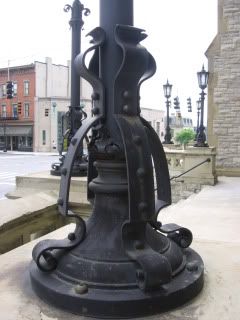Okay, turns out I "lied" about
continuing to post TSR episodes in a timely manner. Posting now resuming...
Out in the fields
The early
morning sun had tipped over the horizon to paint the sky in lemons and salmon
pinks. A drifting gauze of mist softened the edges of the grassy
field. Several sheep dotted around the grass, lazily chewing their cud.
Sora, a bitty
slip of a girl, sat huddled up against a tall lean man with dirty blonde
hair in the shadow of a craggy rock along the fence line.
Her thick wavy
hair had been forced into two tight fat braids, and tiny curls sprouted around
her face and watchful blinking brown eyes. His milk pale skin looked
almost transparent next to the warmth of her darker skin.
She pulled her
feet tighter under the hem of her white flannel night dress, trying to keep
them warm. Most of the other strangers had already gotten up, grumbling,
and wandered away. Disappearing as so much dissipating mist as they walked
toward the road. She was ready to go somewhere else too.
“Uncle Kerr, are you awake yet?” she
tried again.
“Maybe,” his voice croaked back at her
this time, creaky and hoarse with disuse. At the words she popped up on her
knees peering at his face. His eyelids fluttered.
"Please, wake up?" She tugged
hopefully at the front of his sleeping shirt.
This, along with the cold
discomfort of hard ground underneath him and the reality of her presence,
finally brought him fully awake. His eyes snapped open, and he sat up abruptly. Then blinked at the impossibility of his surroundings.
When he had fallen asleep he could have
sworn it was in his own bed, in his old college apartment above Ralph's Apothecary.
A city away from Sora. The strangeness of that thought penetrated his thoughts. Never mind the distance between where they lived. He had
lived in that apartment with Hank years before Sora was born. Years before Hank
had even married Lily. He looked down at her, dazed. Now she was old enough to be a girl
of...six.
How could he have been living in that
apartment? How could he have forgotten about Sora? About everything that came
after his college years? How could he be in a field?
He looked down at his feet for a moment
to block out the sky and the grass and the wide brown eyes and the questions.
Then he saw what he was wearing. Hang on, why was he wearing the red candy cane
striped flannel sleep set his mother always insisted they wear on
Christmas morning? He hated them, all scratchy and cheesy.
"Where are we?" was the question
he finally settled on voicing, not expecting a reply.
"Shepherd Sam's field," piped
back Sora.
"What?" He looked back at her, trying to translate the words into something that made sense.
"Shepherd Sam's field. From daddy's
stories?" Her words were
patient, if slightly patronizing now.
"That's a real place?" He
couldn't keep the shock out of his voice. He would have sworn on his life
that the world of Shepherd Sam was completely fictional.
In fact, he was positive it had been
fictional, a composite of photos torn from magazines, and culled from old
books, and printed off the internet. He had watched his brother
sketch and design and redesign all through college.
"Duh," Sora rolled her eyes at
him and climbed to her feet. She was cold and tired of waiting for him.
He scrubbed his face with his hands and
wished for a cup of hot steaming coffee. It was too early to deal with this
insanity.
As he took a look around he found the
world making even less sense. The pastoral scene and winding road did in fact
look very much like his brother Hank's Shepherd Sam comic. Off in the
distance he could even see a shepherd teetering on the stilt seat that was
straight out of a pen and ink drawing Hank had found in a book from the 1800s.
He looked back at Sora, who very
definitely existed. From a future he hadn't remembered before he went to sleep
last night. As she stood in a made up field. She seemed to be having a
whole lot less trouble with this than he was.
"Can we go see Grandma Nan
now?" asked Sora, pointing.
And, sure enough, down the winding road
off to their right, he could just see the puffing smoke from a fat chimney that
looked a lot like Grandma Nan's. The fictional Grandma Nan. He sighed. Grandma Nan was always good for coffee
and hot food in Hank's comic wasn't she? Maybe she would feed two passing
friendly strangers dressed only in their nightclothes and going slowly insane. Yes. Coffee was
definitely the next step. Even if it was fictional coffee.
He shoved himself to his feet and then
bent to pick up Sora.
"Let's see if we can find some
breakfast before we try to think about this, hey?" He felt her head nod
against his neck before it dropped to his shoulder.
For those who are interested in the pen
and ink drawing of the shepherd see here.





.JPG)













.png)
.png)

